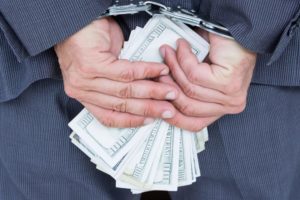 Judge Fisher continued in relevant part: Defendant’s argument would also, if accepted, create an unusual subset of candidates who would be criminally liable while excusing others, because the argument suggests that a candidate who is already a public servant or public official could be held criminally liable but not a candidate who holds no public office at the time. For example, if defendant was a public servant of any sort, even a position having no relation to the campaign in question or the bribe offered or received, like the defendant in Schenkolewski, defendant’s interpretation would place him within N.J.S.A. 2C:27-2’s reach. The argument suggests that is only the happenstance that defendant held no other public office or position that kept him out of the statute’s reach. Considering the statute – by its very language – allows no such exception, and since we have already held a candidate for office is subject to N.J.S.A. 2C:27-2 without qualifying it in the way defendant argues, we decline the invitation to interpret the statute to reach the nonsensical conclusion, see N.J. Repub. State Comm. v. Murphy (2020) (holding that statutes must be interpreted to avoid “absurd results”); State v. Provenzano (1961) (recognizing that statutes cannot “be construed to lead to absurd results” and that “all rules of construction are subordinate to that obvious proposition”), that the Legislature intended to create a subset of candidates who are entitled to accept bribes with impunity.
Judge Fisher continued in relevant part: Defendant’s argument would also, if accepted, create an unusual subset of candidates who would be criminally liable while excusing others, because the argument suggests that a candidate who is already a public servant or public official could be held criminally liable but not a candidate who holds no public office at the time. For example, if defendant was a public servant of any sort, even a position having no relation to the campaign in question or the bribe offered or received, like the defendant in Schenkolewski, defendant’s interpretation would place him within N.J.S.A. 2C:27-2’s reach. The argument suggests that is only the happenstance that defendant held no other public office or position that kept him out of the statute’s reach. Considering the statute – by its very language – allows no such exception, and since we have already held a candidate for office is subject to N.J.S.A. 2C:27-2 without qualifying it in the way defendant argues, we decline the invitation to interpret the statute to reach the nonsensical conclusion, see N.J. Repub. State Comm. v. Murphy (2020) (holding that statutes must be interpreted to avoid “absurd results”); State v. Provenzano (1961) (recognizing that statutes cannot “be construed to lead to absurd results” and that “all rules of construction are subordinate to that obvious proposition”), that the Legislature intended to create a subset of candidates who are entitled to accept bribes with impunity.
To further support his argument that he is unanswerable for his alleged corrupt agreement, defendant refers to the no-defense provision of N.J.S.A. 2C:27-2 quoted earlier. This provision reinforces our understanding that defendant may be found criminally liable for the conduct alleged since it forecloses the arguments that defendant was not a public servant or public official when he allegedly accepted a bribe or that the law requires that he have the ability at the moment of the alleged bribe to fulfill his part of the bargain by declaring arguments like this are “no defense” to a bribery prosecution.
An additional point that supports the Court’s decision is that some elections are won by landslides, with polls showing who will be the obvious winner months before the election occurs. The defense position would allow heavily favored candidates to accept bribes with impunity so long as they do so before the election is finalized.
